With the rise of Thai millennials, the country is seeing a similar rise in the use of Japanese pop culture as political weapon to fight against authoritarianism.
The official result of the election is on its way and many things are going on in Thailand. Accusations, fake news, and lawsuits have loomed large over the last two months as many groups, especially the establishment, have used them as political weapons. The political parties of the democratic camp have been working hard on their campaigns too and now they are trying to form a government. But one element is just as important, with a growing influence in Thai politics: Japanese popular culture.

Popular culture is always a part of politics. Figures in pop culture always have influence over public discourse. For example, the Chinese government cancelled a Maroon Five concert in 2015 because one member of the group met the Dalai Lama. Sometimes, figures from popular culture even became politicians themselves such as Ronald Reagan, Arnold Schwarzenegger and Donald Trump. The trend is here in Thailand too, where many Thai actors and singers have joined political parties –on both the authoritarian and democratic side.
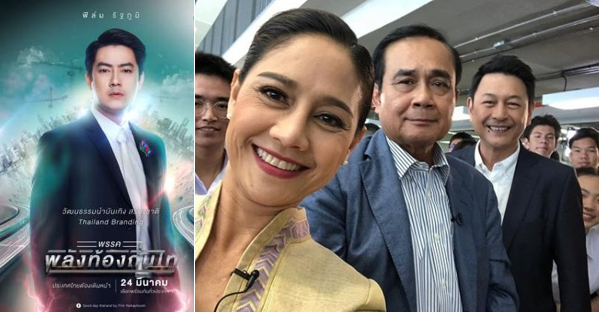
Left: Rattaphum 'Film' Tokongsup a star running for MP.
Right: Sinjai 'Nok' Plengpanich and Songsit 'Kob' Roongnophakunsri showing support for Prayut before election.
Many politicians, government agencies, and civil society organizations regularly use cultural references to make themselves popular, and some pop culture content is taken more seriously than other. In Thailand, there was a time when Japanese pop culture became a threat to Thailand's national security. In 2016, the Thai government requested a thorough investigation into Pokemon Go out of fear that it might threaten national security. Seeing old concepts of geopolitics disappearing before his own eyes, Deputy Prime Minister Gen Prawit Wongsuwan begged players not to hunt Pokemon near to military bases.
Japanese pop culture has an impact on Thai politics in other ways too, especially now that millennials who grew up with it are using it as a political weapon against authoritarianism. The junta has also tried to attract support from the young by using it, but not without adverse consequences.
New secret weapon
Recently, Thailand has seen a rise in the use of Japanese pop culture. One Piece, Dragon Ball, and Ultraman have been incorporated into political campaigns. On 21 March 2019, in Constituency 2 of Ratchaburi Province, Nithiphat Chinchotworasit, MP candidate of the Chart Pattana Party, wore a Goku costume along with his campaign team.
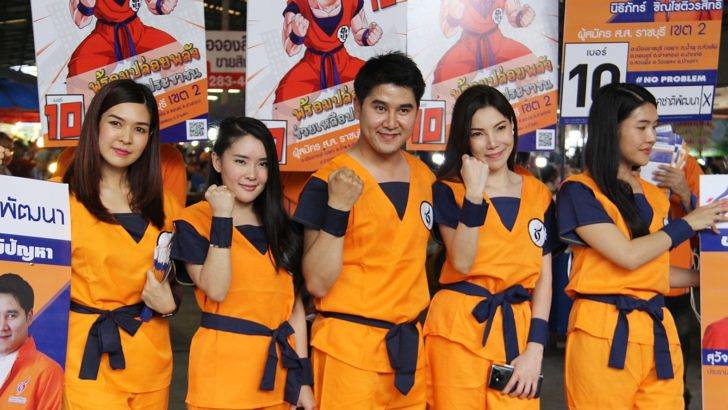
MP candidate of Chart Thai Pattana Party in Goku's uniform
Asked why they wore these costumes, Nithiphat said that orange is the symbolic colour of the party. His team said it would be fun to try. One can wonder if voters felt awkward talking to them, but reports said that the team received good feedback. “Golden economic era, golden era led by ‘Na Chart’ (the late Chatichai Choonhavan, Prime Minister 1998-91), still remains in the memories of many. We will work hard to bring back the golden economic era and peace to Thailand,” said Nithipat.
References to One Piece are also widespread in Thailand. Even though he did not run in this election, Sombat Boonngamanong, a pro-democracy activist and now the leader of the Grin Party, wears a Gol D. Roger pirate hat almost all the time to compare winning with becoming the King of Pirates. He even had his members wear low-cost versions to many anti-junta protests. Combining references to One Piece and the concept of open-source pirate parties, the party vows to bring entertainment into Thai politics.
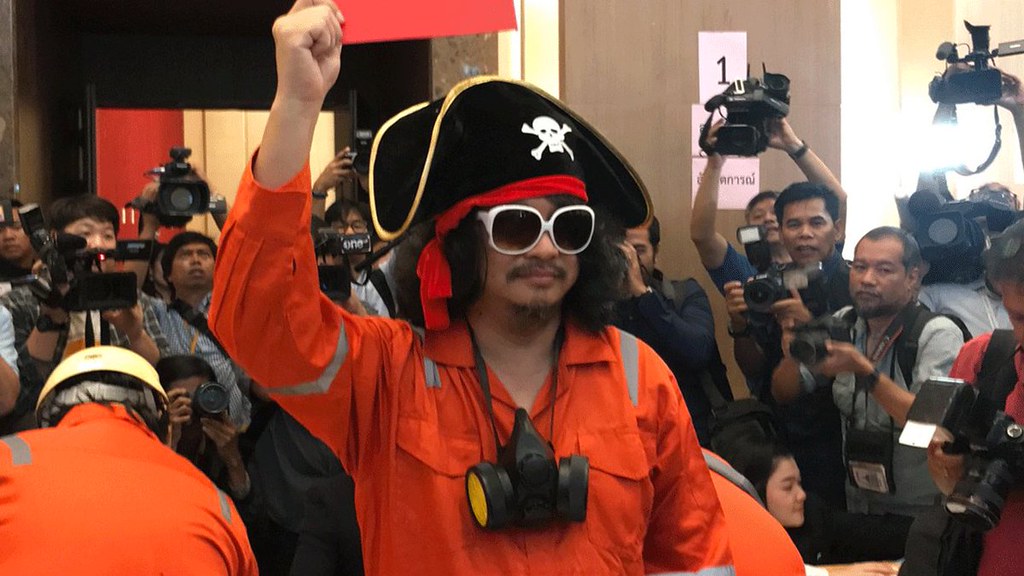
Sombat Boonngamanong
Source: @Aunarisk
Chadchart Sittipunt, a PM candidate of Pheu Thai, famous for his physical strength, also borrowed help from Ultraman’s power to promote his election campaign. The video produced by his fans got 724k views, 26k likes and 23,709 shares.
Naruto Parody: Shadow Clones in Thai Politics
However, the use of manga and anime are not limited to political parties, but also other social groups. Perhaps the most prominent of these is Narutu – Thai political parody of Naruto Shippuden. Characters in Naruto Shippuden have been modified into one Thai (in)famous political figure after another. Sasuke has been turned into 'Sasuyut' (Prayut Chan-o-cha). Orochimaru into 'Orojeammaru' (Somsak Jeamteerasakul), Uchiha Itachi into 'Chinnawa Itaki' (Thaksin Shinawatra), and Senju Tobirama into Tobiramark (Abhisit 'Mark' Vejjajiva). The core narrative of friendship, acceptance of pain and grievance, and the persistent struggle for recognition, has been turned into a hilarious political parody.
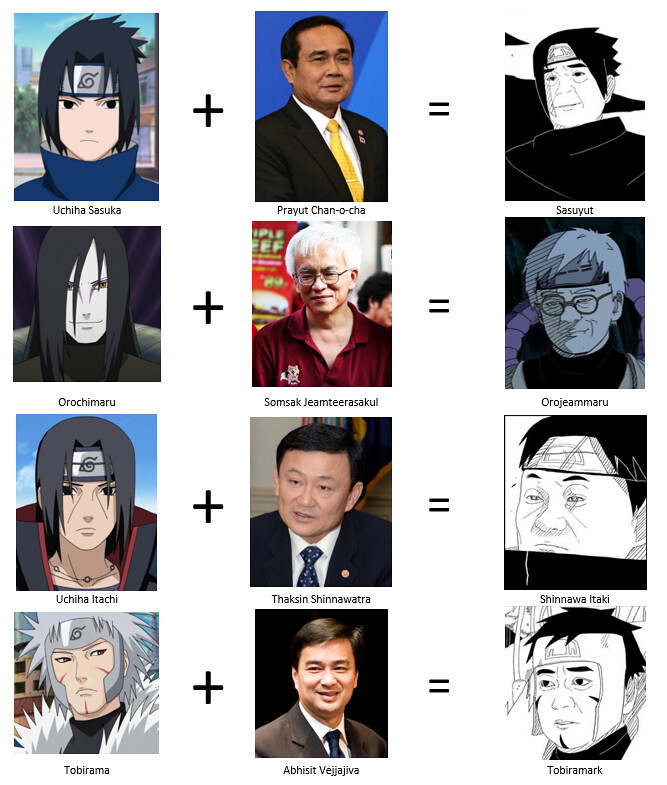
The village of Konoha (hidden leaf) becomes Kalaha to describe Thailand (kala is a coconut shell, commonly used in Thai to refer to an echo chamber where people are ignorant of the outside world). Kirigakure (village of hidden mist) is used to describe the Phra Pradaeng area of Bangkok suffocating in PM2.5 particulate pollution. Just before the election, the page also encouraged citizens to vote saying the protagonist had never been drawn because everybody is Naruto:
“Why there is no Naruto character on this page? Naruto is a ninja who saves the village. Likewise, on this parody page, the character Naruto is you, all of our fans who will save the village tomorrow. Let’s fight for the village, Kalaha’s shinobi.”
In our interview with the page admin, who likes people to call him “Genin of Kalaha”, he said he started the page in January 2018. “I was working in the cartoon industry, and I was also interested in politics and Naruto. I wanted cartoon readers to be more interested in politics.
“I think there is politics in every cartoon. I started this page just because I like Naruto the most. Like, during the peace and normalcy of our time, something mysterious, unknown and secretive is going on: [people] seeking power to be the village’s leader, the one who also has duties to take care of the village.”
During 5 years of dictatorship, the slogans propagated by the National Council for Peace and Order (NCPO) have been peace, orderliness, and happiness. But behind the scene, much has been suppressed for opposing the junta. Thailand is under the restrictions of NCPO orders, the lèse majesté law, the Public Assembly Act, and the Computer Crime Act.
According to iLaw, an independent organization, as of July 2018, 94 people have been prosecuted under the lèse majesté law, 421 for violating NCPO orders restricting public assembly, 14 for failure to report to the NCPO, and 91 under Article 116 for sedition. As of March 2019, 55 cases have been filed under Articles 14 (1) and (2) of the 2017 Computer Crime Act by the junta for causing societal division and public confusion.
Asked if he is afraid of being prosecuted for mocking the dictator, he said “I felt a bit worried, because just after I started the page, Kai Meaw [a famous political cartoon page in Thailand] disappeared for quite some time. But I thought of adding a lot of hair styles, and blindfolds, and so on. And at that time not so many people clicked 'like' on my pages. I did not think the big shots would be interested in something like this. But as the election approached, I drew more readily and intensely.” A year later, the page gained more than 100,000 likes.
Many politicians and members of junta have been the target of Genin of Kalaha’s mockery. As he said in the interview, “I mock everyone equally”. However, one can say it's more pointed for some than for others. For example, Deputy Prime Minister Gen Prawit Wongsuwan, who possesses 25 luxury watches without declaring them among his assets as required by the anti-corruption law, is mocked as ‘Danzo’, a conservative character who stole Sharingan from members of the Uchiha family and embedded it in his artificial arm.
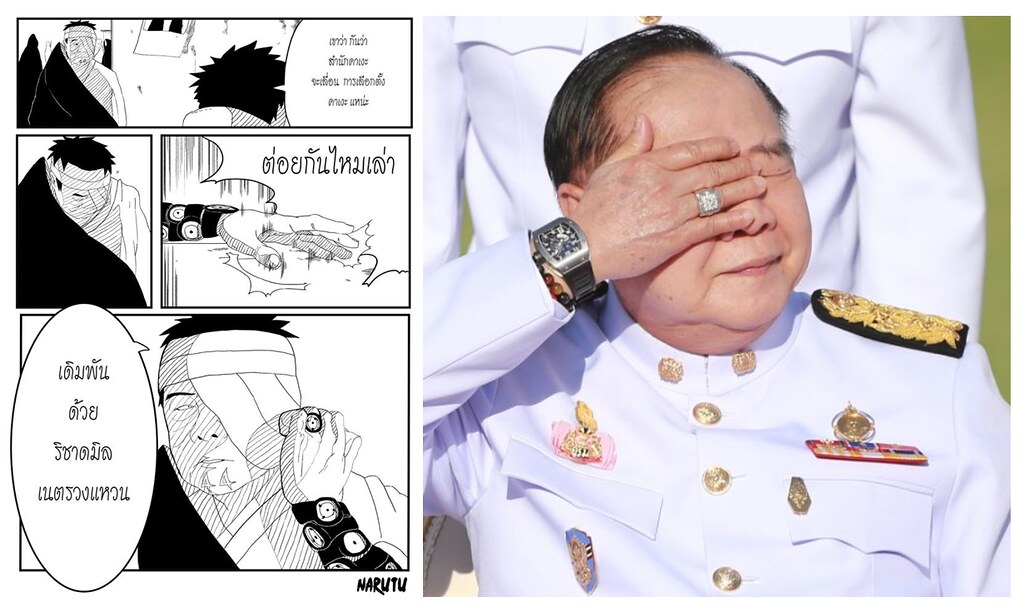
Prawit Wongsuwan and his Deputy Kage Parody
The page also set the tone for the election campaigns. A picture of a Phalang Pracharat Party’s election campaign which exaggerated the number of supporters using Photoshop was mocked as similar to Naruto’s Kage Bunshin no Jutsu (shadow clone technique). Several Facebook pages also posted about it.
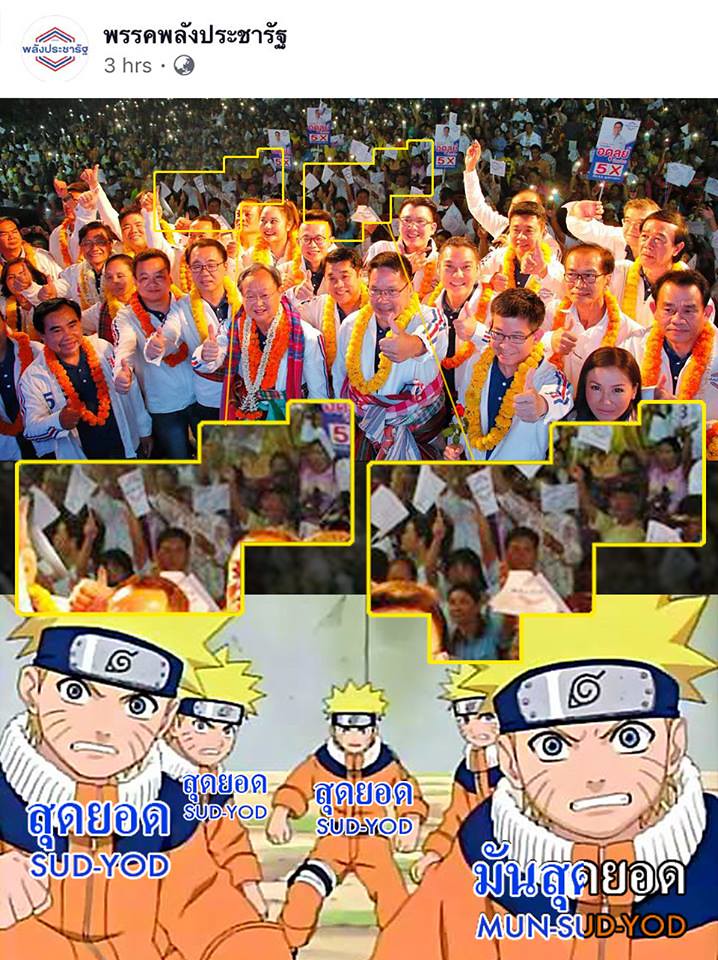
Phalang Pracharat's Kage Bunshin
Source: Basement Karaoke
Leave aside games, anime, and unrecorded numbers, Naruto is one of the best-selling manga in the world with 235 million copies sold. From 1999-2014, a large proportion of Thai millennials must have related to it one way or another. Under Thailand’s restrictive environment, the millennials born into Japanese pop culture use it to speak truth indirectly, but effectively, and in turn expose the absurdity of authoritarianism.
BNK48’s controversies
Some have used other manga and anime to mock the Thai dictator too. For example, many have mocked Gen. Prayut Chan-o-cha as ‘Akaiyut,’ a Thai parody version of Gen ‘Akainu’ from One Piece, the best-selling manga of all time with 451 million copies. A particular cartoon post shows a parallel universe where even bounties of Straw Hats declined due to the poor economy and falling rubber prices under Gen Prayut’s government. The cartoon also mocks his infamous quote: “just go to Mars if you don’t like it.” The internet also sees Thai politicians and public figures depicted as Straw Hat pirates.

Source: Taak Sapankaaw

Thanathorn as Luffy, Chatchart as Zoro. Usopp as Abhisit, etc. And guess who is a member of the Celestial Dragons!
Source: ผู้ชายใส่แว่น
But the junta doesn’t want to get mocked forever. In April 2018, Prayut Chan-o-cha, in hope of attracting young supporters, invited BNK48, a famous Japanese music franchise in Thailand, to Government House to advertise its Happy Family Radio. Cherprang Areekul, Captain of BNK48, also accepted Prayut’s invitation to host “Thailand moves Forward”, a TV programme that propagates the junta’s agenda, causing a controversy over whether an individual has a right to support dictatorship.
In January 2019, BNK48 faced a separate controversy when Pichayapa ‘Namsai’ Natha was shown on TV performing in a t-shirt with the Nazi swastika. The Israeli Embassy in Thailand issued a statement that the incident was an insult to millions of people whose relatives had been killed in the Holocaust. Namsai and BNK48 apologized to the Israeli Embassy in Thailand and promised to promote awareness about the Holocaust.

‘Namsai’ apologized to the Israeli Embassy in Thailand
Source: Israel in Thailand
On the negative side, Japanese pop culture may promote authoritarianism just as much as it may promote democracy. But one can look at these controversies optimistically. Cherprang's controversy triggered activists and intellectuals to educate society that it's a misconception when one says that a public figure has a right to support the junta. Invoking Article 30 of the Universal Declaration of Human Rights, Soraj Hongladarom, a professor from Faculty of Arts, Chulalongkorn University said that no one has "any right to engage in any activity or to perform any act aimed at the destruction of any of the rights and freedoms..." BNK48 also agreed with the German Ambassador to hold a workshop about the history of Holocaust. Japanese pop culture in Thailand at least promotes fruitful political debates and an authoritarian regime using pop culture to promote itself can face political backfire.

Cherprang Areekul
Source: Wikipedia
Another BNK48 member, Patchanan ‘Orn’ Jiajirachote said to her fans in August 2018 before the general election that she wanted to be a ‘presenter’ for elections and vote just like her parents had done. On 17 March 2019, she cast her vote first time and encouraged people to go out and vote. With 250 unelected senators and a politically compromised Election Commission, the system is unfair and encouraging people to participate in it can be problematic, but boycotting elections can also risk giving the upper hand for the military to stay in power and in turn reverse 5 years of progress that the democratic opposition fought hard for.

Patchanan ‘Orn’ Jiajirachote
Source: The Standard
In the general election, 7 million first-time voters were eligible to vote and many more are millennials. Seeing a rigged and unfair political system before them, a large number of millennials are using the Japanese pop culture they grew up with as best as they can to fight for justice, freedom, and equality.

Since 2007, Prachatai English has been covering underreported issues in Thailand, especially about democratization and human rights, despite the risk and pressure from the law and the authorities. However, with only 2 full-time reporters and increasing annual operating costs, keeping our work going is a challenge. Your support will ensure we stay a professional media source and be able to expand our team to meet the challenges and deliver timely and in-depth reporting.
• Simple steps to support Prachatai English
1. Bank transfer to account “โครงการหนังสือพิมพ์อินเทอร์เน็ต ประชาไท” or “Prachatai Online Newspaper” 091-0-21689-4, Krungthai Bank
2. Or, Transfer money via Paypal, to e-mail address: [email protected], please leave a comment on the transaction as “For Prachatai English”
